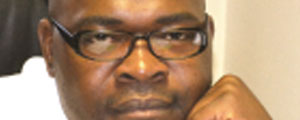
If you are reading this, it means either you survived the Mayan prophecy or the prophecy itself was a fib. Opinion by Tapiwa Gomo
While you may take the prophecy as a joke, there are many across the world that took it seriously and invested huge amounts of money into building arks in case the world was flooded again.
Let’s get back to real things. Today, I am discussing what must be a difficult question to answer. Just who is African in Africa?
Of course the simple answer to this question is everyone in Africa is African. Or perhaps everyone born and bred on the continent is an African. But these are porous answers when you consider that there are some white farmers who were kicked out of their inherited land because of their colour and the history of their fathers.
That process alone implied that perhaps they were considered by those in power to be not African enough. That included other whites whose parents did not take anyone’s land.
So we are still stuck, who is African? It’s a complicated question to address because it is surrounded by so many contentious dynamics and conceptualisations.
Being African is not easily definable unless you know what it means to be one. It is not about being black or having anything to do with colour.
Recently in South Sudan, I was asked by a local friend what Africa looks like. Yes, I was shocked because I didn’t expect such a question from him. His question implied that in his mind, he was not African. But on hindsight, I realised that it was not the first time that I was hearing a person I thought was African implying they were not in Africa.
- Open letter to President Mnangagwa
- Feature: ‘It’s worse right now than under Mugabe’: Sikhala pays the price of opposition in solitary cell
- Masvingo turns down fire tender deal
- Human-wildlife conflict drive African wild dogs to extinction
Keep Reading
Some South Africans think their country is not in Africa, likewise some Namibians. It is even worse in the Arabic part of Africa, where most of the young generation think Africa is a distance away from them, even when their national sport teams play in African competitions.
In fact, being African has no legal definition because Africa as a continent does not issue citizenship or passports, so it’s an identity we assume is ascribed on us, and yet we do not have any record to show for it.
It is an insipid identity which we can’t see or touch and why others, who look like us in the same continent, believe are not Africans.
For most people, it is a certain skin colour together with certain set features that make them African, while for others, skin pigmentation is not enough. Geographical location also matters and respect and love for African traditions is a must.
There are a lot more black people in Brazil, Caribbean islands, the United States and across the world who do not associate themselves with Africa.
The debate on who is African usually tends to base itself of race, colour and skin colour, neglecting the fact that there is more to being an African than the pigmentation in one’s skin, and how human genes have evolved and diversified.
For those who say they are not Africans but are citizens of African countries and yet they have never been out of their country, neither have their parents nor their great grand parents been out of their districts, the denial is inspired by the colonisers, and want, to one way or the other to escape the stigmas that beset the African identity.
This is largely because being African is associated with poverty, barbarism, dictatorship, poverty and every bad thing that one can imagine.
So they find solace in their national identity than the continental identity. I met a Motswana somewhere bragging that he was not an African but a special race that finds itself on the continent and should not be associated with what happens on it.
It is a choice one can not deny others even though when one is surrounded by many questions of identity.
For some being Africa is about poverty and backwardness, and may be not so much of race and colour.
On the other hand, others, in their quest to monopolise on their African identity, seem to automatically exclude those who do not posses similar features to them, or rather anyone whom they believe resembles the colonisers in any way, no matter what they look like.
Take for example, white Zimbabweans whose parents were neither farmers nor grandchildren of the coloniser.
This discussion may sound abstract and theoretical, but many countries have developed policies that can be considered racist because they are based more on race or perceived origin. They are based on the assumptions of where one is perceived to have originated than his present status.
Indigenisation policies are among those which place race at the forefront of their agenda.
It is sad that some people have been denied the right to claim their choice of identity and citizenship based on trivialities like race or country of father or mother’s birth, even when they were born and bred in Zimbabwe.
Merry Christmas and a happy new year!
Tapiwa Gomo is a development consultant based in Pretoria, South Africa











